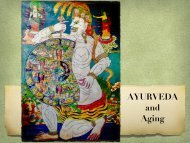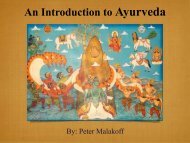How Thoreau's Walden Pond Mixed with the Ganges and Yoga Came to America with Swami Vivekananda
One early morning in 1846, during the coldest days of a New England winter, Henry David Thoreau looked out the window of his small cabin on Walden Pond and saw men cutting its ice into blocks. That ice was hauled by horse to a railroad that ran across the western edge of Walden Pond, packed into a boxcar, taken to Boston and loaded onto a clipper ship that sailed to Calcutta, India, arriving about four months later. Once there, that ice was purchased by grateful members of the East India Company. Thoreau had witnessed a small part of the global ice trade between New England and India that took place during the latter part of the nineteenth century. When Thoreau considered the ice trade, his vision sailed on metaphors far beyond the scope of business. The waters he imagined flowed both east and west and carried not just natural elements, but culture, religion and philosophy as well. He envisioned that after arriving in Calcutta, the New England ice of Walden Pond would eventually melt and run downhill where it would join with the sacred water of the Ganges. He wrote in Walden: "It appears that the sweltering inhabitants of Charleston and New Orleans, of Madras and Bombay and , drink at my well. In the morning I bathe my intellect in the stupendous and cosmogonal philosophy of the , since whose composition years of the gods have elapsed, and in comparison with which our modern world and its literature seem puny and trivial; and I doubt if that philosophy is not to be referred to a previous state of existence, so remote is its sublimity from our conceptions. I lay down the book [Bhagavad-Gita] and go to my well for water, and lo! there I meet the servant of the Bramin, priest of and and who still sits in his temple on the Ganges reading the , or dwells at the root of a tree with his crust and water jug. I meet his servant come to draw water for his master, and our buckets as it were grate together in the same well. The pure Walden water is mingled with the sacred water of the Ganges." This book tells the story of these waters . . .
One early morning in 1846, during the coldest days of a New England winter, Henry David Thoreau looked out the window of his small cabin on Walden Pond and saw men cutting its ice into blocks. That ice was hauled by horse to a railroad that ran across the western edge of Walden Pond, packed into a boxcar, taken to Boston and loaded onto a clipper ship that sailed to Calcutta, India, arriving about four months later. Once there, that ice was purchased by grateful members of the East India Company. Thoreau had witnessed a small part of the global ice trade between New England and India that took place during the latter part of the nineteenth century.
When Thoreau considered the ice trade, his vision sailed on metaphors far beyond the scope of business. The waters he imagined flowed both east and west and carried not just natural elements, but culture, religion and philosophy as well. He envisioned that after arriving in Calcutta, the New England ice of Walden Pond would eventually melt and run downhill where it would join with the sacred water of the Ganges. He wrote in Walden: "It appears that the sweltering inhabitants of Charleston and New Orleans, of Madras and Bombay and , drink at my well. In the morning I bathe my intellect in the stupendous and cosmogonal philosophy of the , since whose composition years of the gods have elapsed, and in comparison with which our modern world and its literature seem puny and trivial; and I doubt if that philosophy is not to be referred to a previous state of existence, so remote is its sublimity from our conceptions.
I lay down the book [Bhagavad-Gita] and go to my well for water, and lo! there I meet the servant of the Bramin, priest of and and who still sits in his temple on the Ganges reading the , or dwells at the root of a tree with his crust and water jug. I meet his servant come to draw water for his master, and our buckets as it were grate together in the same well. The pure Walden water is mingled with the sacred water of the Ganges."
This book tells the story of these waters . . .
You also want an ePaper? Increase the reach of your titles
YUMPU automatically turns print PDFs into web optimized ePapers that Google loves.
Professor Henry Wright<br />
“John Henry Wright (February 4, 1852 – November<br />
25, 1908) was an <strong>America</strong>n classical scholar born at<br />
Urumiah (Rezaieh), Persia. He earned his Bachelors<br />
(1873) <strong>and</strong> Masters (1876) at Darmouth College,<br />
New Hampshire. After junior appointments (first in<br />
Ohio <strong>and</strong> <strong>the</strong>n at Dartmouth) in 1886 he joined<br />
Johns Hopkins as a professor of classical philology.<br />
In 1887, he became a professor of Greek at Harvard,<br />
where, from 1895 <strong>to</strong> 1908, he was also Dean<br />
of <strong>the</strong> Graduate School of Arts <strong>and</strong> Sciences . . .<br />
On 25 August 1893, at Bos<strong>to</strong>n, Vivekan<strong>and</strong>a met Wright for <strong>the</strong> first time.<br />
Wright was amazed by Vivekan<strong>and</strong>a's profound knowledge <strong>and</strong> urged him <strong>to</strong> attend<br />
<strong>the</strong> upcoming Parliament as a speaker. He was so much as<strong>to</strong>nished that he<br />
invited Vivekan<strong>and</strong>a <strong>to</strong> stay in his house as a guest. From 25 August <strong>to</strong> 27<br />
August 1893, Vivekan<strong>and</strong>a stayed at Wright's house at 8 Arling<strong>to</strong>n Street.<br />
When Vivekan<strong>and</strong>a <strong>to</strong>ld Wright that he did not have any credential or bona<br />
fide <strong>to</strong> attend <strong>the</strong> Parliament he reportedly <strong>to</strong>ld him— "To ask you, <strong>Swami</strong>, for<br />
your credentials is like asking <strong>the</strong> sun about its right <strong>to</strong> shine." Then Wright himself<br />
wrote a letter of introduction <strong>to</strong> <strong>the</strong> chairman of <strong>the</strong> Parliament of <strong>the</strong><br />
World's Religion <strong>and</strong> suggested <strong>to</strong> him <strong>to</strong> invite Vivekan<strong>and</strong>a as a speaker stating<br />
– "Here is a man who is more learned than all our learned professors put <strong>to</strong>ge<strong>the</strong>r."<br />
Wright also learned that Vivekan<strong>and</strong>a did not have enough money <strong>to</strong> buy a<br />
railway ticket, so, he bought him a railway ticket <strong>to</strong>o. Even after <strong>the</strong> conclusion<br />
of <strong>the</strong> Parliament, <strong>the</strong>y kept in <strong>to</strong>uch <strong>with</strong> each o<strong>the</strong>r through correspondence.<br />
Vivekan<strong>and</strong>a remained ever thankful <strong>to</strong> Wright for his help <strong>and</strong> kindness. In a<br />
letter written on 18 June 1894, Vivekan<strong>and</strong>a addressed Wright as bro<strong>the</strong>r <strong>and</strong><br />
wrote – "S<strong>to</strong>ut hearts like yours are not common, my bro<strong>the</strong>r. This is a queer<br />
place – this world of ours. On <strong>the</strong> whole I am very very thankful <strong>to</strong> <strong>the</strong> Lord for<br />
<strong>the</strong> amount of kindness I have received at <strong>the</strong> h<strong>and</strong>s of <strong>the</strong> people of this country<br />
– I, a complete stranger here <strong>with</strong>out even 'credentials'. Everything works for<br />
<strong>the</strong> best.”<br />
– Wikipedia, The Free Encyclopedia<br />
Related Glossary Terms<br />
Dr. Barrows<br />
Index<br />
Find Term


















